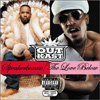
Comment
on this story
|
 |

This Week: Album of the year from OutKast, and Mayer delivers another gem
OutKast

Speakerboxxx/The Love Below (Arista)
For such a forward-looking album, OutKast's double-disc set belongs to a pretty old-fashioned tradition: the sprawling, self-indulgent follow-up to a commercial/critical breakthrough (in this case, 2000's Stankonia). Like Fleetwood Mac wandering into the ether on Tusk or The Clash refusing to edit themselves on Sandinista!, the Atlanta hip-hop duo have taken their yin-yang act to its logical extreme. Rather than accommodating each other's eccentricities as they did on their first four albums, mack-daddy Big Boi and psychedelic loverman Andre 3000 have each recorded a solo disc and slapped them together.
It should be a mess, and sometimes it is. It's also the album of the year. Go figure.
Big Boi's disc, which leads off, takes the (somewhat) more conventional route, pairing his deadpan rapper's drawl with a series of giddy hooks. The OutKast faithful will feel right at home on the mindbending opener "Ghetto Musick" (produced by Andre, just to reassure us that they're still friends), where a speed-of-light technofunk chorus runs smack up against a church organ and an otherworldly pillow-soft break punctuated by Munchkin voices. Elsewhere, "The Way You Move" ropes in crooner Sleepy Brown for a gliding, grinding Southern soul jam, "The Rooster" rides a paranoid ascending scale of chicken-scratch wah-wah, and "War" looks back in anger at the 2000 election ("Basically, America, you got fucked").
Andre's longer, looser workout is all about the booty. Big Boi might be harder, but Andre's hornier—even God (who turns out to be a woman) helps him get laid. There's precious little rapping, but Andre's a fine singer, in the playful mode (and very much under the sway) of Prince. The Love Below meanders through cocktail jazz, hip-hop, brassy funk, R&B quiet storms and techno trickery, not to mention the infectious acoustic pop of "Hey Ya!" Some of the skits drag, and the album as a whole could lose at least 25 minutes. But its excess is part of its charm. It's hard to complain about having too much fun.
—Jesse Fox Mayshark
John Mayer

Heavier Things (Columbia)
When John Mayer's wildly popular major-label debut, Room For Squares, burst onto the scene two years ago, fans were taken with its refreshing emotional openness and bubbly acoustic guitars. Pressure on Mayer must have been enormous to simultaneously deliver another hit studio album and mature as an artist. The new Heavier Things succeeds on both counts. It finds Mayer still searching for meaning in relationships and career, only this time around he asks better questions and comes up with more profound answers.
Mayer wrote these songs on an electric guitar, intending them for a bigger, full-band sound. Musically riskier and deeper, Mayer's trademark lyrical inventiveness has also grown. On the haunting "Something's Missing," Mayer sings, "When autumn comes/ It doesn't ask/ It just walks in where it left you last/ You never know when it starts/ Until there's fog inside the glass around your summer heart." With the lilting, tongue-in-cheek song "New Deep," he pokes fun at his navel-gazing tendencies, swearing off dissecting his life to death—at least for now.
"Numb is the new deep/ Done with the old me/ I'm over the analyzing/ Tonight," he sings, trying to convince himself he'd be happier if he gave up the constant questioning.
The best and most bittersweet song of the album is "Wheel," a meandering, jazzy, Zen-like meditation on love, life, and the art of letting go. Dealing with the end of a relationship, Mayer sings, "I believe that my life's gonna see/ The love I give returned to me." Mayer seems to be working out the realization that love, even when it's good, isn't necessarily fairy-tale forever, but he maintains a hope in the rebirth of the seasonal, the circular, the karmic.
Mayer has created a sadder, less immediately accessible, but ultimately more rewarding album than Room For Squares. It's full of yearning, searching, grieving loss, trying to catch happiness before it flies away. Not all the songs shoot arrows straight through your heart, but when they hit, they hit hard.
Heavier Things is both hopeful and messy—just like life in your twenties.
—Laila Shahrokhi

October 9, 2003 * Vol. 13, No. 41
© 2003 Metro Pulse
|